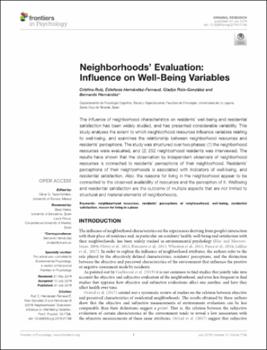Neighborhoods' Evaluation. Influence on Well-Being Variables
Fecha
2019Resumen
The influence of neighborhood characteristics on residents’ well-being and residential
satisfaction has been widely studied, and has presented considerable variability. This
study analyses the extent to which neighborhood resources influence variables relating
to well-being, and examines the relationship between neighborhood resources and
residents’ perceptions. The study was structured over two phases: (1) the neighborhood
resources were evaluated, and (2) 252 neighborhood residents was interviewed. The
results have shown that the observation by independent observers of neighborhood
resources is connected to residents’ perceptions of their neighborhood. Residents’
perceptions of their neighborhoods is associated with indicators of well-being, and
residential satisfaction. Also, the reasons for living in the neighborhood appear to be
connected to the observed availability of resources and the perception of it. Wellbeing
and residential satisfaction are the outcome of multiple aspects that are not limited to
structural and material elements of neighborhoods.






